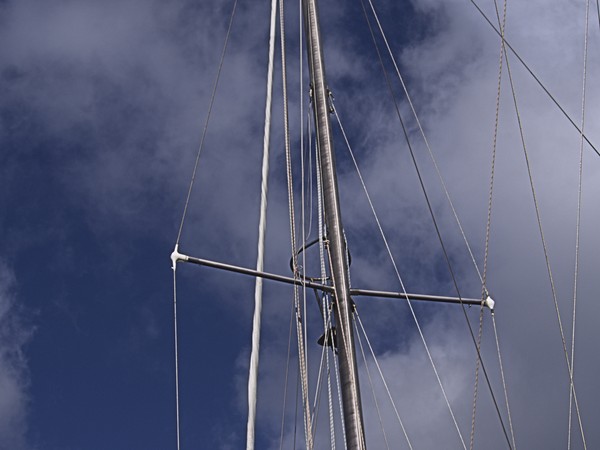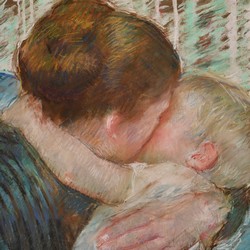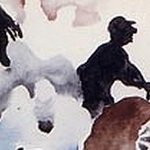
Life at sea is hard. However little we know about, we can infer the cold in their bones in winter, the homesick during long crossings, the danger of storms. Technology, modern equipments and other facilities available in the 21st century relieve life in ships and make it safer, but even so. Now, let us imagine how life at sea was one hundred and fifty years ago, according to what literature and cinema explain.
At that time, in 1865, a poem entitled Le long du quai (Along the quay) was published that remind us the difficulties of life at sea without mention them, starting from the similarity between two words: vaisseaux [vessels] and berceaux [cradles]. While in port, the vessels don't pay attention to the cradles rocked by a mother's hand; only when they sail, they will notice how the cradles try to retain them. Adventurous men at sea, weeping women at home. The poet doesn't even try to justify men leaving because they have no choice, because it's their duty, because they have to earn a living. No, the last stanza of the poem reads that the vessels flee from the harbour. The second one is still clearer: women must weep and men must satisfy curiosity about seeing the world. And after reading these verses, we don't know whether women's tears are about the sadness of being apart for a long while, the fear of losing their men, their helplessness in the face of such a powerful rival or their anger because they can't choose. Or perhaps that's not what the poet means, and mine is just a present, out of context interpretation.
A few years later, in 1879, Fauré composed an atypical Mélodie with this poem. We know the quiet mood of the composer or, rather, of his songs, and we're surprised by the unusual exaltation of the voice in these central verses, "Et que les hommes curieux |Tentent les horizons qui leurrent!" [And curious men must be tempted | toward horizons that will delude them!], marked in the score with a crescendo molto (the first one) followed by a forte sempre (the second one). The general trend of the song is, however, quiet, and it draws an arc around these sentences; just like the poet plays with the similarity between vaisseaux and berceaux, the composer plays with the similarity between the rhythm of a barcarolle (i.e. a boat swinging in calm waters) and that of a cradle song, and creates one of his most successful songs, Les berceaux.
The berceaux is included in Fauré's second collection of Vingt mélodies, published in Opus 23 along with two more gorgeous songs, Notre amour and Le secret, and the author of the verses is Sully Prudhomme; this was the third, last song the composer wrote with one of his poems. The first two, composed in 1875, are the little-known, Ici-bas! and the famous Au bord de l'eau, about which I spoke in one of my first posts. Back then, I only dedicated a couple of lines to the poet, so today I'm writing a few more lines about him.
René François Armand Prudhomme, this was his full name, was born in Paris in 1839. The sources I've consulted say he started studying engineering, but an eye condition caused him to give up and study law instead. I wasn't able to find what kind of disorder forced that change, maybe it had to do with the hours of dedication? (When I studied engineering, law students had half class hours than us). The thing is that he devoted himself primarily to literature; to poetry, but also to essays, with a particular interest in philosophy, religion and science. You may wonder why did I entitle "Inertia" to this article, and that's because the last two verses of the poem; the reference to the mass of the vessels restrained by the cradles reminded me of the definition of this property. Fauré changed the name of the poem (a change approved by Prudhomme), and I would say that he enhanced that way the power of the cradles.
Le long du quai is included in Prudhomme's first book of poems; this work, published when the poet was twenty-six, was well-received, and his prestige increased over time to a point where he was one of the first five Nobel laureates, in 1901. The Swedish Academy awarded him the prize of literature "in special recognition of his poetic composition, which gives evidence of lofty idealism, artistic perfection and a rare combination of the qualities of both heart and intellect". There seems to have been a scandal (doesn't it happen every year?) when some Swedish writers publicly protested against that decision; they considered that Leo Tolstoy should have been awarded. But it was impossible that Tolstoy was awarded, because none of the thirty-seven submitted nominations nominated him, and I wonder why didn't those Swedish writers nominate Tolstoy.
I don't know if Sully Prudhomme deserved the prize, but he's one of the poets that song lovers remember and appreciate because of poems such as Le long du quai, turned into song by Fauré. I hope that you like the version of Patricia Petibon and Susan Manoff, and that you listen to some other performance because, as usual, there are considerable differences between versions.
Le long du quai, les grands vaisseaux,
Que la houle incline en silence,
Ne prennent pas garde aux berceaux,
Que la main des femmes balance.
Mais viendra le jour des adieux,
Car il faut que les femmes pleurent,
Et que les hommes curieux
Tentent les horizons qui leurrent!
Et ce jour-là les grands vaisseaux,
Fuyant le port qui diminue,
Sentent leur masse retenue
Par l'âme des lointains berceaux.
Along the quay, the great ships
that the sea-swells tilt in silence,
take no notice of the cradles
rocked by the hands of women.
But the day of parting will come,
because women must weep
and curious men must be tempted
toward horizons that will delude them!
And that day, the great ships,
fleeing from the port that grows small,
will feel their mass restrained
by the soul of distant cradles.
(translation by Emily Ezust)
















Comments powered by CComment